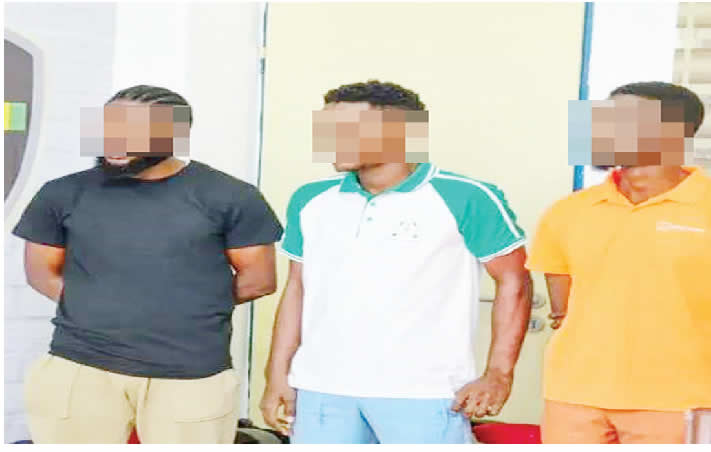
Some lawyers have condemned the public parade of the suspects alleged to be operators of the popular blog site, Gistlover, and asked the Nigeria Police to release or charge the suspects to court if they have sufficient evidence.
This followed the recent arrest and parade of three suspected operators of the blog, which was contained in a statement released by the Public Relations Officer of the Nigerian Police Force, Olumuyiwa Adejobi, on Friday.
PUNCH Metro had earlier reported that the police said they had arrested three bloggers; Adebukola Kolapo, Nnedum Somtomchukwu, and Isaac Akpokighe, accused of engaging in cyberstalking through their alleged involvement with a popular blog site, GistLover.
Adejobi noted that the Nigeria Police Force National Cybercrime Centre while acting on a petition submitted by one Dr. Seye Oladejo, arrested three suspects in connection with a case of conspiracy, cyberstalking, and threat to life.
The police also said digital forensic analysis led to the recovery of eight Gistlover pages allegedly created on the instruction of the head of the syndicate by Adebukola, and wallet addresses used in laundering money.
However, the popular blog, on its Instagram page, had challenged the police to provide proof that those arrested were its operators, noting that there was no evidence connecting the suspects with the blog.
In an interview with our correspondent on Sunday, a former executive member of the Nigerian Bar Association, Kunle Edun, said the arrest was both shocking but not expected, adding that the police must have sufficient evidence linking the suspects to the blog to prevent abuse of human rights and witch-hunt.
He said, “The law provides that arresting a person indicates that there is already a prima facie evidence of the person having committed an offence or there is a reasonable ground that the person is about committing an offence. Therefore, there must be a reasonable ground to justify the arrest. If not, then the arrest is unlawful.
“A mere invitation to the managers of Gistlover should have sufficed because they did not kill any person or stole billions like top government officials who are being begged to answer the invitation of security agencies. While big thieves and criminals are invited and are given the privilege of choosing the time to honour such invites, the poor and the defenceless are never accorded similar privileges; they are arrested without notice and publicly displayed as if they killed a human being or committed armed robbery.”
Edun stressed that the Nigerian legal system did not allow media trial and it would be discriminatory to continue to detain the suspects without charging them to court.
The lawyer added that, “Civil law has provided sufficient remedies to any person whose character has been defamed in any way, social media inclusive. Is it not surprising that it is only the rich and famous in society that resort to the help of the police when they claim to be cyber-bullied? Cyberstalking, cyberbullying or criminal defamation are actually crimes specially created to cater only for the politicians and the rich, so that they will use the coercive instruments of the state against the poor. It is akin to the law against sedition which has been abolished by the court.”
Another lawyer, Tosin Ojaomo, noted that the continuous operation of the blog site even with the detention of the trio might mean that the real operators of the blog were not the suspects.
He said, “The fact that the arrest of these persons didn’t hamper the continuous operations of the blog should signal a lot to the team of investigators that the real people may be at large. Since those who are currently in custody are presumed innocent in the eyes of the law, their fundamental human rights must be respected and if there is evidence against them, they should be charged to court and not be paraded in the media.
“Our courts and several laws have condemned the parade of suspects in the media and also, arrest in lieu of the real offender has been made illegal under the Administration of Criminal Justice Act, 2015. Since the police said they have evidence against the suspects, there is no basis to remand them because the essence of a remand order is to complete the investigation.”
The Secretary of the Nigerian Bar Association Section on Public Interest and Development Law, Abuja branch, Vincent Adodo, said the police would be wrong to remand the suspects while conducting their investigations, adding that the investigators must also prove that the suspects were the true faces behind the blog.
“The question relating to the suspects’ identities must be answered by the police. It will be prejudicial to the innocence of the suspects and illegal for the police to publicly declare them as operators of Gistlover,” he said.
Another legal practitioner, Dolapo Habeeb, said the police should exercise caution in handling the matter, adding that the suspects should either be released or charged to court as their identities could not truly be confirmed until evidence were tendered.
She said, “The Nigeria Police continues to go against our laws by parading suspects in public who are presumed innocent until proved guilty. What if, at the end of the day, they could not prove that the suspects are the actual faces of the blog? The police should charge them to court if they have enough evidence showing their level of involvement in the crimes alleged as stated in their release.”
In recent times, the Nigeria media have recorded rising cases of illegal detention of suspects by the Nigerian police. This has equally led to an increasing number of fundamental rights enforcement cases filed before the court against law enforcement agencies by victims of unlawful detention who felt their rights have been violated.
In 2020, the Socio-Economic Rights and Accountability Project, a Nigerian non-governmental organisation, sued the federal government and Cross River state government for the illegal detention and torture of a journalist, Agba Jalingo, for 34 days.
There have also been concerns that public parade of suspects by the police negatively affects criminal cases when the actual court hearings start as suspects are subject to media conviction. Legal practitioners have frowned at this problem as they contend that suspects paraded face stigma and find it difficult to integrate back into the society if eventually released or found innocent.
To combat this menace, civil societies, advocacy groups, and international bodies have continued to advocate for the adherence to the laws that protect rights of citizens arrested based on criminal suspicions. These procedures, as cited, are contained in Nigeria’s 1999 constitution, the Administration of Criminal Justice Act 2015, Police Act, and international frameworks like the African Charter on Human and Peoples Right.





